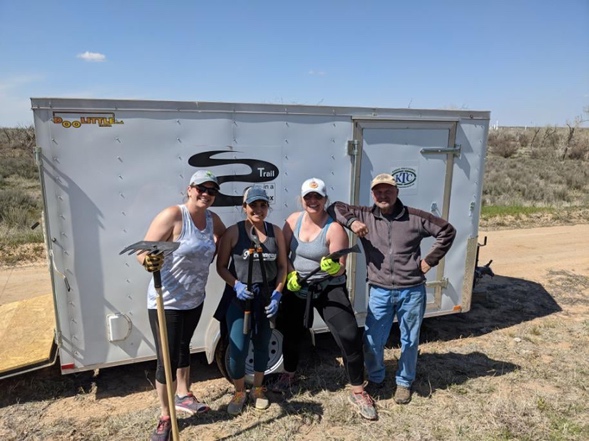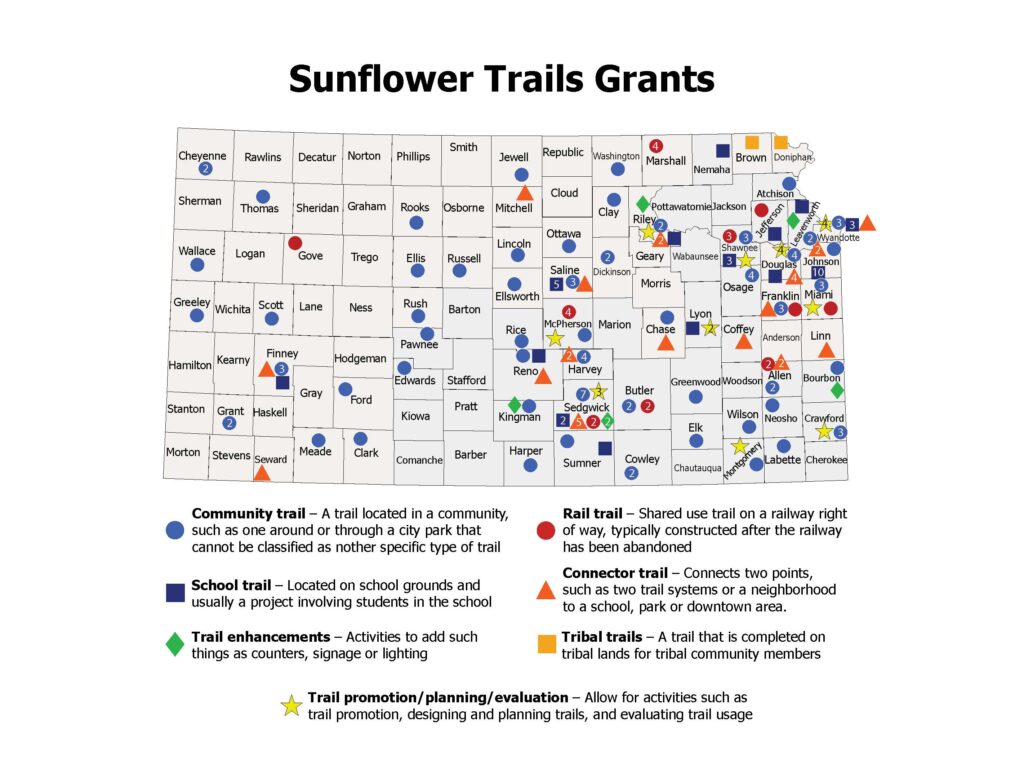Investing in People & Places
Through capacity building, support of the built environment, advocacy, collaborative learning and strengthening access to quality health care, our work reflects our responsiveness to the health needs of Kansans in three strategic areas – Healthy Communities, Health Systems, and our Sunflower Nonprofit Center. See a list of grants Sunflower Foundation has awarded.
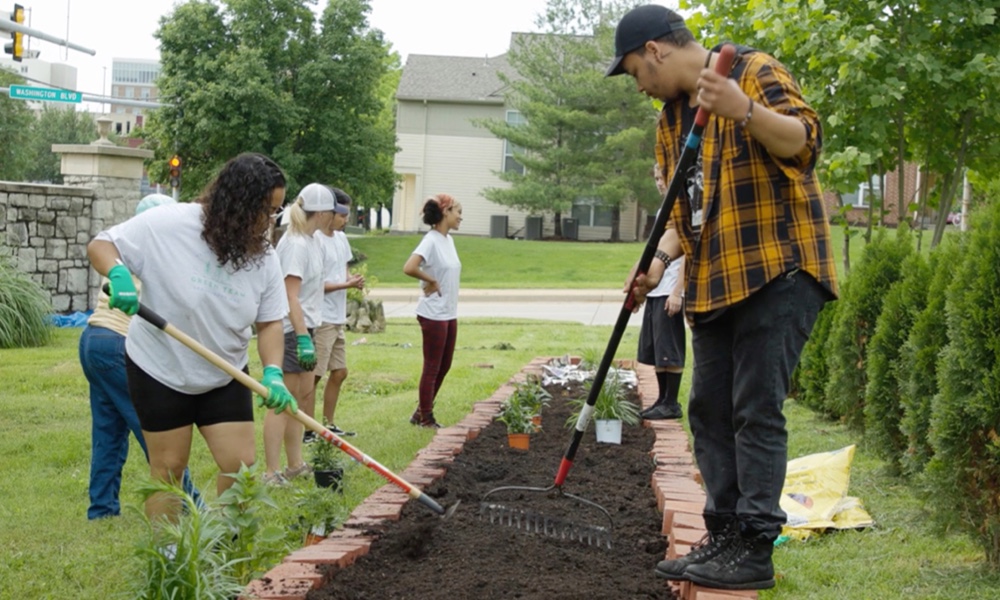
Our Work
Healthy Communities
We strive to enhance the built environment and expand access to healthy food through systems, structures and surroundings that make healthy living achievable and affordable for all.
Sunflower Trails
Time spent in nature is important to our health. Since 2005, Sunflower Foundation has been partnering with communities, schools and nonprofits across the state to ensure that all Kansans have access to trails and are able to enjoy the physical, mental and community benefits that come with connecting to nature.
The foundation has supported over 200 trail projects through community-based trail builder grants, the Trail-in-a-Box community volunteer program and other regional trail planning initiatives.
Links to other trails resources:
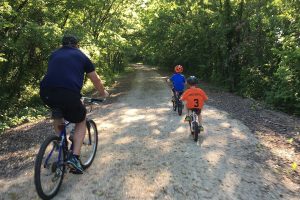

Food Access/Security
Access to healthy food is essential to the health and well-being of all Kansans. Food- and nutrition-secure families and communities are more likely to thrive.
Through grant-making and other initiatives, Sunflower Foundation supports work that addresses specific food and nutrition access and security needs and gaps in local food systems.
Our work in this area has included:
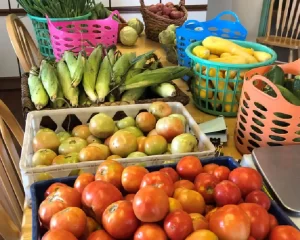 Capacity building grants for food banks across the state to help them meet growing food access and security needs in mostly rural communities, including support for a statewide food access coordinator and an interactive website to help locate emergency food assistance anywhere in the state.
Capacity building grants for food banks across the state to help them meet growing food access and security needs in mostly rural communities, including support for a statewide food access coordinator and an interactive website to help locate emergency food assistance anywhere in the state.- Support for rural communities’ efforts to address food access needs through the Healthy Eating: Rural Opportunities (HERO) program, which targeted rural communities working to save and sustain their local grocery stores.
 During the first summer of the COVID-19 pandemic, Sunflower Foundation partnered with the Kansas Health Foundation on the Feeding Kansas Kids initiative, which supported schools providing healthy meals to children through the USDA Summer Food Service Program. More than 5.6 million meals were distributed across 118 school districts.
During the first summer of the COVID-19 pandemic, Sunflower Foundation partnered with the Kansas Health Foundation on the Feeding Kansas Kids initiative, which supported schools providing healthy meals to children through the USDA Summer Food Service Program. More than 5.6 million meals were distributed across 118 school districts.- Partnering with the four sovereign Native American nations in Kansas in support of providing culturally appropriate nutrition education and development of a Tribal Food System plan.
Links to food access/security resources:
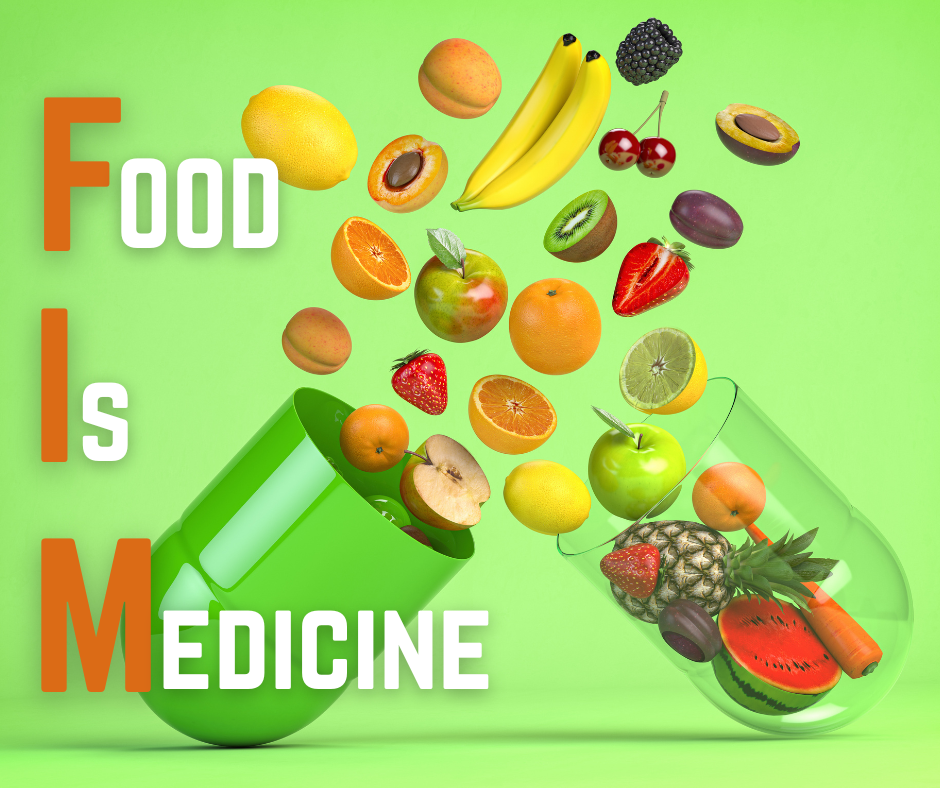
Food is Medicine
Nutrition plays a critical role in preventing, treating and managing chronic disease. Working with the state’s food banks and a cohort of Federally Qualified Health Clinics (FQHCs), the Foundation is at the crossroads of food and health, striving to help create a model of care that improves health outcomes and curbs rising health costs for Kansans suffering from chronic conditions.
In 2022, Sunflower Foundation launched its Food is Medicine initiative, which targets patients in the primary care safety net system who are suffering from chronic conditions and are lacking proper nutrition.
Through a partnership with Sunflower Foundation, Kansas Food Bank, Harvesters – The Community Food Network, and six FQHCs spread across the state, the initiative provides patients with such items as medically tailored groceries, nutritious food and meal ingredients, and cooking educational opportunities – all with the purpose of helping them better manage their chronic disease.
The following clinics are participating in the Food is Medicine initiative:
- The Community Health Center of Southeast Kansas (Pittsburg)
- Genesis Family Health (Dodge City/Garden City)
- HealthCore Clinic (Wichita)
- Health Ministries Clinic, Inc. (Newton)
- Heartland Community Health Center (Lawrence)
- Hoxie Medical Clinic (Sheridan County)
Links to Food is Medicine resources:
- Pre-implementation Planning Methods and Formative Evaluation Findings
- Aspen Institute 2024 Food is Medicine Research Action Plan
- Aspen Institute: Watch the Food is Medicine Research Action Plan Webinar
- Center for Health Law and Policy Innovation: Produce Prescriptions
- Food is Medicine: Peer-reviewed Research in the U.S.
- The Food Trust: Addressing Nutrition and Food Access in Medicaid
- VIDEO: Nourishing Healthy Starts: The Fresh Rx Story
- VIDEO: Dr Steven Chen and Recipe4Health
- VIDEO: Trina Ragain – Food is Medicine as Disruptive Innovation
- VIDEO: Cultivating a Food is Medicine Approach
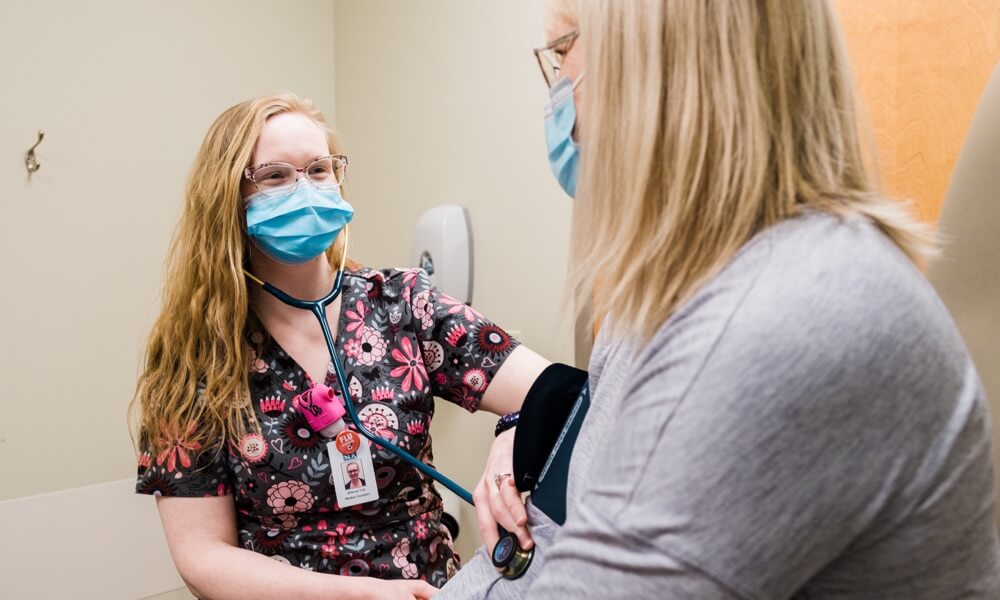
Our Work
Health Systems
We support systemic change, strengthen organizational capacity, and invest in innovative strategies to ensure that more Kansans receive the right care, in the right place, and at the right time.
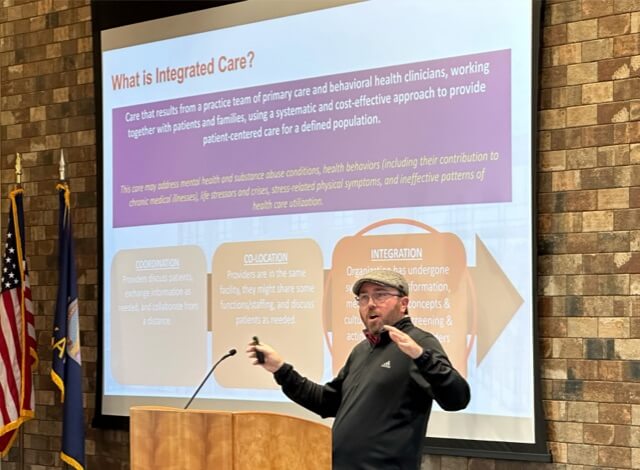
Integrated Care
Recognizing that physical and mental health are inextricably intertwined, integrated care unites primary and behavioral health care into one seamless system where medical and mental health professionals work together to provide a smooth, patient-centered continuum of care.
Sunflower Foundation, which supports improving Kansans’ access to integrated care and advancing organizations’ ability to implement and deliver services through the integrated care model, believes treating the whole person and making the mind-body connection improves patient outcomes, increases patient and provider satisfaction and reduces costs to the health care system.
Our work in this area has included:
- Since 2011, when the foundation’s board of trustees approved our Integrated Care Initiative, the foundation has awarded over 50 grants across 17 Kansas counties to community mental health centers, Federally Qualified Health Centers (FQHCs) and community health centers in primarily rural communities in support of their efforts to plan for, implement, transition to and sustain integrated care models.
- The foundation supported the Bipartisan Policy Center in developing a national integrated care task force and a set of recommendations to support integrated care implementation.
- In 2022, the foundation expanded its support for integrated care through a series of grants to a network of rural health clinics. This latest initiative provides technical assistance and collaborative learning through a partnership with the Health Innovations Network of Kansas (HINK) and the Eugene Farley Health Policy Center at the University of Colorado, a national leader in integrated care research and implementation. HINK serves as the hub and convener for integrated care learning for the participating clinics, and the Eugene Farley Health Policy Center provides technical assistance and a yearlong immersive learning experience for the clinics that covers key components of integrated care implementation.
Links to resources on integrated care:
- Tackling America’s Mental Health and Addiction Crisis Through Primary Care Integration -Bipartisan Policy Center
- The Building Blocks of Behavioral Health Integration – The Eugene S. Farley, Jr. Health Policy Center & the Practice Innovation Program at the University of Colorado Anschutz Medical Campus
- Advancing Care Together – Department of Family Medicine at the University of Colorado
- The Academy – Integrating Behavioral Health and Primary Care – Agency for Healthcare Research and Quality (AHRQ)
- Atlas of the Integrated Behavioral Health Care Quality Measures – Agency for Healthcare Research and Quality (AHRQ)
- Lexicon for Behavioral Health and Primary Care Integration – Agency for Healthcare Research and Quality (AHRQ)
- SAMHSA-HRSA Center for Integrated Health Solutions
- Clinical Workflows and the Associated Tasks and Behaviors to Support Delivery of Integrated Behavioral Health and Primary Care – U.S. National Library of Medicine
- Cost savings associated with an alternative payment model for integrating behavioral health in primary care – National Library of Medicine
- Financial integration of behavioral health in Medicaid managed care organizations: A new taxonomy – Center for Health Systems Effectiveness

Behavioral/Mental Health
While health systems recognize that behavioral health is essential to whole health, and that people living with serious mental illness and addictions typically experience substantially worse health outcomes and higher health care expenditures than the general population, access to behavioral health care remains a critical issue in Kansas and across the nation.
Sunflower Foundation supports innovative efforts to modernize the state’s behavioral health care delivery system, bolster and train its workforce, and raise awareness of mental health issues and initiatives with a goal of increasing early intervention for Kansans struggling with mental illness and improving access to the health services they need.
Our work in this area has included:
- Capacity-building grants to behavioral/mental health centers and organizations across the state in support of their efforts to improve mental health response.
- Providing a grant to National Alliance on Mental Illness (NAMI) Kansas for development of two new Western Kansas affiliates to strengthen mental health wraparound supports in the western half of the state and to develop rural-based programming to better meet the needs of smaller communities.
- Support for community mental health centers in their transition to becoming Certified Community Behavioral Health Centers (CCBHC). The CCBHC model features a more collaborative, whole person approach to community-based mental health care. In 2021, the Kansas legislature voted to require all 26 of the state’s licensed community mental health centers to transition to the CCBHC model by 2024, and nearly two-thirds of them still are working toward the certification and are doing so without federal assistance.
- Support for the implementation of Kansas’ 988 Suicide & Crisis Lifeline, a 24/7 crisis call center staffed by trained counselors ready to help callers navigate any mental health or crisis concern. The foundation has worked with the call centers and other partners to identify specific needs and augment resources available to address suicide prevention and the sustainability of the Kansas 988 system. Learn more about the Kansas 988 Suicide & Crisis Lifeline.

Public Health
Effective and efficient public health systems are essential in improving the vitality of communities. By leveraging existing capacity in local health departments, helping them build expertise through training, and creating a better understanding of public health among county leaders across Kansas, the foundation supports projects and initiatives that bolster the underlying public health system across the state.
Our work in this area has included:
- Support for smaller, rural health departments to increase their capacity to deliver public health services in their communities.
- Providing emergency response funding, with the assistance of the Kansas Association of Local Health Departments (KALHD), to 72 mostly small, rural public health departments to address immediate financial needs during the early months of the COVID-19 pandemic.
- Support for local health departments, particularly those in western Kansas counties with high numbers of COVID-19 cases, to bolster their capacity in the early months of the pandemic.
- Support to KALHD, in partnership with the Kansas Association of Counties, Kansas Health Institute and the University of Kansas and Wichita State University, to develop a webinar series to help county commissioners navigate public health complexities.
- In April 2021, the Sunflower BOT approved a grant to the Bipartisan Policy Center to support development of a strategic vision and implementation plan for U.S. governmental public health modernization.
- Support to expand the state health department’s largest population health data set to enable programmers to extract county and regional estimates for key health issues. This allows city and county organizations to have greater access to more localized data as they work to develop grant applications to support their work.
- Support for research from the University of Virginia to better understand deaths of despair and data on white working-class mortality in Kansas.
- Support for the foundation’s largest investment ($1 million-plus) to better understand the social determinants of health in Kansas communities.
- Support for the Kansas Public Health Practice and Innovation Initiative through the University of Kansas Medical Center, connecting public health experts in the academic setting to local health departments in Kansas that have limited capacity.
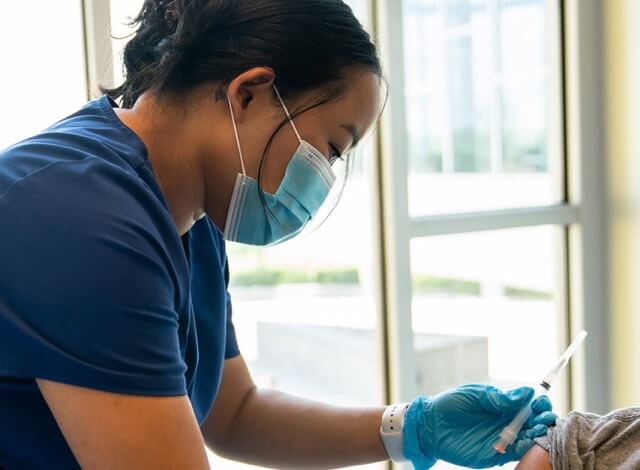
Primary Care Safety Net
Strengthening the state’s health care safety net – made up of providers that deliver essential health services to the uninsured, Medicaid beneficiaries and members of other vulnerable populations who might otherwise not receive the care they need – is critical to the overall health and well-being of Kansans.
Through capacity building and other health initiatives, the foundation has supported community health clinics, Federally Qualified Health Centers (FQHCs), rural health centers and community mental health centers in their efforts to address health care inequities and expand access to health care services in their communities. See a full list of FQHCs, safety net clinics and community mental health centers.
Our work in this area has included:
- The foundation’s Bridge Grant program, which launched in 2005, improved access to health care services by targeting safety net providers that were struggling to meet the needs of the uninsured and underinsured populations. Grants helped fund the addition of primary care clinicians who were part of new or expanded medical, dental or behavioral health care services. Over a seven-year period, the foundation awarded $9 million in grants to more than 50 organizations, ranging from rural health clinics to large community health centers.
- Support for the foundation’s Integrated Care Initiative, which has awarded over 50 grants across 17 Kansas counties to community mental health centers, Federally Qualified Health Centers (FQHCs) and community health centers in primarily rural communities in support of their efforts to plan for, implement, transition to and sustain integrated care models. The next phase of integrated care involves a series of grants to a network of rural health clinics and provides technical assistance and collaborative learning through a partnership with the Health Innovations Network of Kansas (HINK) and the Eugene Farley Health Policy Center at the University of Colorado.
- The 2022 launch of the Food is Medicine initiative, which supports a cohort of FQHCs from across the state striving to create a sustainable model of care that improves health outcomes for Kansans suffering from chronic disease. The initiative supports patients with chronic conditions who are lacking proper nutrition and provides them such items as medically tailored groceries, nutritious food and meal ingredients, and cooking educational opportunities – all with the purpose of helping them better manage their chronic disease.
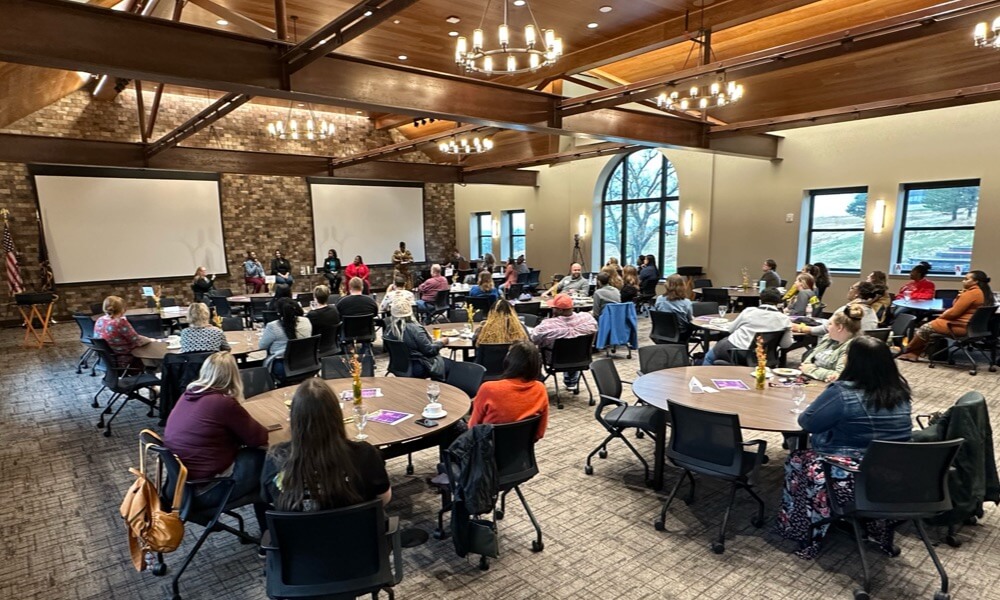
Our Work
Sunflower Nonprofit Center
Sunflower Foundation’s work has long supported capacity building, leadership development, and learning opportunities for nonprofit organizations.
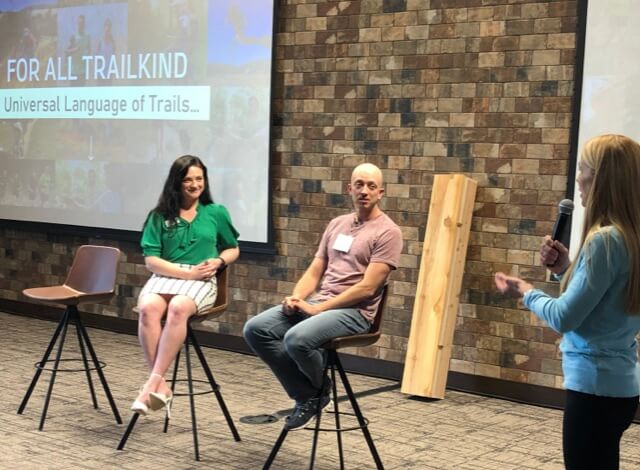
With the opening of the Sunflower Nonprofit Center in October 2021, we now offer meeting space and additional resources that support the needs of nonprofits whose work align with the foundation’s mission. Two restored, century-old buildings anchor the 13.5-acre Nonprofit Center campus, from which the foundation strives to expand on its mission by offering:
- Meeting and conference space for nonprofits, educational institutions, government entities and other public groups to support their education and convening needs.
- State-of-the-art technology for onsite and virtual meetings, conferences and webinars.
- Plans for a future shared workspace environment that will promote collaborative learning and partnerships.
- Shared back-office services, including printing, IT systems, bulk purchasing, reception and other shared staffing.
- Access to outdoor spaces and walking trails.
- Nonprofit rates for groups of all sizes and budgets.
Go to Sunflower Nonprofit Center to learn more.


